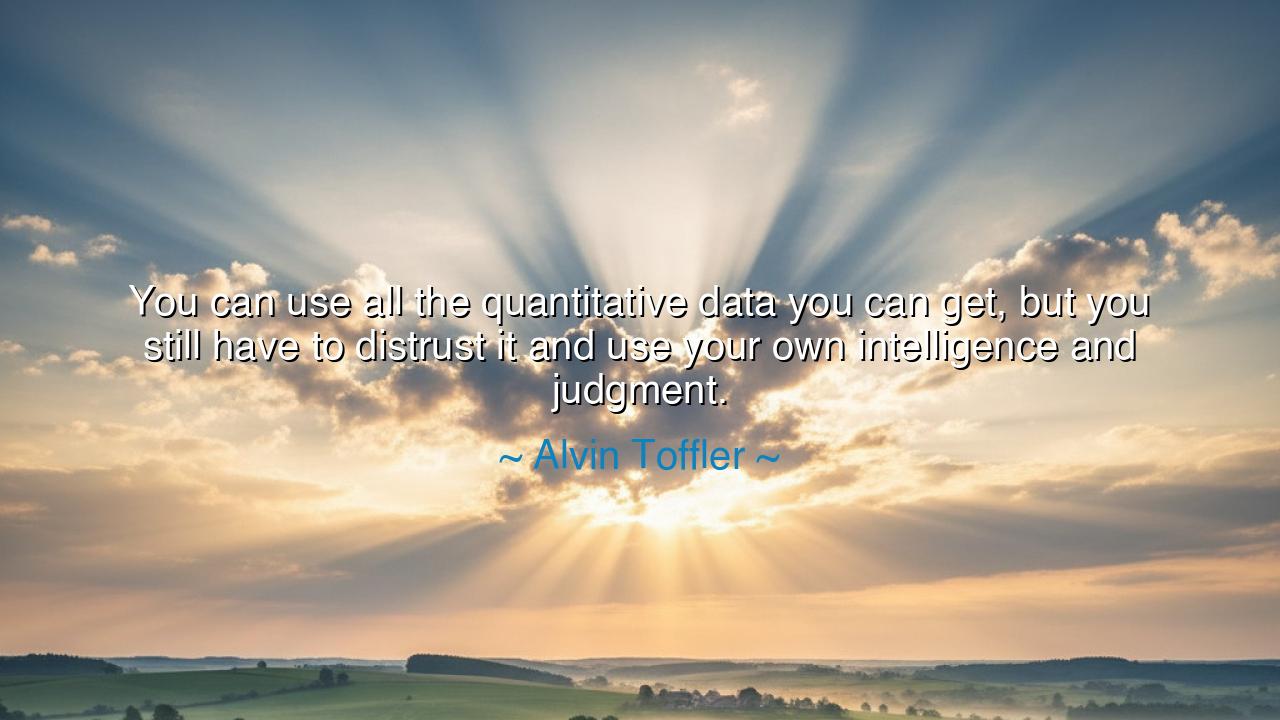
You can use all the quantitative data you can get, but you still
You can use all the quantitative data you can get, but you still have to distrust it and use your own intelligence and judgment.






The Judgment Beyond Numbers
From the visionary Alvin Toffler, prophet of the modern age, comes a warning forged in wisdom: “You can use all the quantitative data you can get, but you still have to distrust it and use your own intelligence and judgment.” These words, though spoken in the age of computers and statistics, carry the timeless ring of ancient truth. They remind us that numbers, though powerful, are not the measure of all things—that data, though vast, cannot see the whole of the human soul. Toffler’s wisdom calls to the thinkers, the leaders, the dreamers of every generation: trust the mind, not the machinery; trust the heart, not the abstraction.
The meaning of this quote lies in the eternal tension between knowledge and wisdom. Quantitative data is the fruit of analysis, the precision of measurement, the language of logic. It gives form to the world’s complexity, allowing us to calculate, predict, and plan. Yet Toffler warns that numbers alone cannot capture the essence of reality. They measure the shell, but not the spirit; they chart the surface, but not the depths. The wise man uses data as a servant, not as a master. He weighs it, tests it, and interprets it through the lens of intelligence and judgment—those inner faculties that no machine can replace.
This truth has ancient roots. When the philosopher Socrates walked the streets of Athens, he questioned those who claimed certain knowledge. “You know the measures,” he said, “but do you know what is right?” The mathematicians could measure the heavens, yet they could not measure justice. The merchants could count their coins, yet they could not count the worth of a virtuous life. Socrates knew what Toffler would one day proclaim: quantification without reflection leads to blindness. Wisdom begins not in counting, but in discerning.
History too offers its warnings. In the years before the Great Depression, the brightest economists of the world looked upon their charts and saw nothing but prosperity. Their numbers were radiant, their models perfect. Yet beneath those golden figures lay the fragility of human greed and fear—truths no graph could measure. When the collapse came, their data proved hollow, and their confidence turned to ruin. It was not the lack of information that destroyed them, but the failure of judgment, the refusal to see beyond the numbers to the living pulse of reality.
Toffler’s insight is born from his vision of a world overwhelmed by information—a world we now inhabit. We are surrounded by data, drowning in statistics, charts, and algorithms. Yet for all our measurement, confusion still reigns. Why? Because wisdom cannot be digitized. Intelligence is not the hoarding of facts, but the weaving of understanding. Judgment is not the cold verdict of numbers, but the warmth of experience, intuition, and conscience. To know how to think is greater than to know what to calculate.
The ancients would say: “A scale measures weight, but not worth.” So too must the modern soul learn this distinction. Distrust the data not because it lies, but because it is incomplete. Test it with reason, balance it with empathy, and temper it with humility. The wise leader listens to reports and numbers, yet also to the quiet voice of conscience and the subtle rhythm of human nature. For it is not the abundance of information that brings wisdom, but the harmony of knowledge and perception.
Let this then be the lesson: in an age where men worship numbers as gods, dare to be human. Gather knowledge, yes—but let it pass through the fire of discernment. Use your intelligence not as a tool of calculation, but as a flame of understanding. Seek patterns in data, but seek meaning in truth. Remember always that the heart perceives what numbers cannot. The greatest insights come not from machines or models, but from the deep wells of human judgment.
And so, O seeker of wisdom, when the flood of information threatens to drown your clarity, return to stillness. Look not only at the figures before you, but at the world behind them—the people, the stories, the unseen forces that shape every number. For the measure of a wise man is not how much he knows, but how deeply he understands. The data may guide your steps, but it is intelligence and judgment that must choose the path. Thus will you walk not as a slave to knowledge, but as its master—and in that mastery lies the art of wisdom itself.






AAdministratorAdministrator
Welcome, honored guests. Please leave a comment, we will respond soon